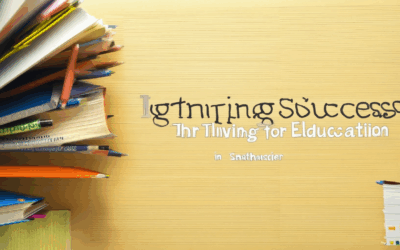In today’s fast-paced academic environment, maximizing student productivity has become essential for achieving success. Students often juggle multiple responsibilities, from coursework to extracurricular activities, making it challenging to stay organized and focused. Whether it’s managing time effectively, leveraging productivity apps, or developing habits that foster efficiency, understanding how to enhance productivity is crucial for excelling in school and beyond. This comprehensive guide explores proven strategies, tools, and tips designed to help students unlock their full potential, overcome common obstacles, and build a strong work ethic. By addressing key areas such as time management, effective study techniques, and staying organized, this article offers valuable insights to help students thrive academically and personally. From identifying the best productivity apps to mastering consistent routines, discover how to optimize your efficiency and stay ahead in your studies.
How Can a Student Maximize Their Productivity?
Maximizing productivity as a student involves a combination of effective time management, healthy habits, and consistent effort. Here are some proven strategies:
- Develop a Clear Study Schedule : Create a structured schedule that allocates specific times for studying, attending classes, and relaxing. Stick to this routine consistently to minimize distractions and boost focus.
- Break Tasks into Manageable Chunks : Divide large projects into smaller, achievable tasks. This approach reduces overwhelm and makes it easier to track progress.
- Utilize Time Management Tools : Leverage tools like planners, digital calendars, or task management apps to organize your responsibilities and set priorities.
- Stay Organized with a Clean Workspace : Keep your study area clutter-free. A tidy environment promotes concentration and efficiency.
- Practice Active Learning Techniques : Engage with material actively through summarization, teaching others, or applying concepts to real-world scenarios.
- Take Regular Breaks : Follow the Pomodoro Technique by working for 25 minutes and then taking a 5-minute break. This maintains focus and prevents burnout.
- Prioritize Health : Ensure you’re getting enough sleep, balanced nutrition, and regular exercise. Physical well-being directly impacts cognitive function and productivity.
- Limit Distractions : Turn off notifications, put your phone on silent, and create a quiet study environment to minimize interruptions.
- Set Realistic Goals : Break down long-term objectives into shorter, measurable goals. Celebrate small achievements to stay motivated.
- Stay Curious and Motivated : Maintain a strong why behind your efforts. Connect your studies to your personal interests and aspirations to foster intrinsic motivation.
By implementing these strategies, students can enhance their productivity, achieve better grades, and enjoy a more balanced and fulfilling academic journey.
How to Increase Productivity While Studying
Increasing productivity while studying requires a combination of organization, effective time management, and self-care. Here are some strategies to help you achieve this:
- Set Clear Goals : Begin by defining what you aim to accomplish. Whether it’s preparing for exams or mastering a subject, having clear objectives can keep you focused.
- Break Tasks Into Smaller Steps : Divide larger tasks into manageable subtasks. This approach reduces overwhelm and allows you to celebrate incremental progress.
- Prioritize Tasks : Use methods like the Eisenhower Matrix to categorize tasks by urgency and importance. Focus on high-priority tasks first to ensure key areas are covered.
- Time Management Techniques : Try the Pomodoro Technique, working in 25-minute intervals followed by 5-minute breaks. This can help maintain focus and prevent burnout.
- Minimize Distractions : Create a distraction-free study environment by turning off notifications and removing tempting devices from your workspace.
- Mindfulness and Meditation : Incorporate brief mindfulness sessions or deep breathing exercises during breaks to reduce stress and enhance concentration.
- Stay Healthy : Prioritize sleep, nutrition, and exercise to maintain energy levels and overall well-being, which directly impacts productivity.
- Learn to Say No : Avoid overcommitting to avoid feeling overwhelmed. Focus on essential responsibilities and allocate time for studying.
- Review and Reflect : After each study session, reflect on what worked and what didn’t. Adjust your strategy as needed and celebrate small achievements to stay motivated.
- Stay Positive : Remind yourself of past successes and practice gratitude to maintain a positive mindset, which boosts motivation and productivity.
- Utilize Tools and Apps : Explore productivity apps and tools that align with your learning style to streamline task management and study processes.
- Seek Support : Join study groups or find a study buddy to stay accountable and share strategies, making the learning process more enjoyable and less isolating.
Best Productivity Tips
Improving productivity is essential for achieving your goals and staying ahead in your tasks. Here are some proven strategies to enhance your efficiency:
- Set Clear Goals:** Prioritize your objectives and break them down into manageable tasks. Knowing what you aim to achieve keeps you focused and motivated.
- Prioritize Tasks:** Use the Eisenhower Matrix to categorize tasks by urgency and importance. Focus on high-priority activities first to maximize your output.
- Utilize Productivity Tools:** Leverage tools like Google Calendar for scheduling or Trello for task management to stay organized.
- Leverage Technology:** Automate repetitive tasks with apps like Notion for note-taking and project management to save time.
- Stay Organized:** Keep your workspace clutter-free and use systems like the 5 Minute Rule to tackle tasks efficiently.
- Master Time Management:** Practice the Pomodoro Technique to boost focus and productivity during work sessions.
- Practice Mindfulness:** Take regular breaks and engage in mindfulness exercises to reduce stress and improve concentration.
- Collaborate Effectively:** Communicate clearly and use collaborative tools to streamline teamwork, ensuring everyone is aligned on project goals and timelines.
- Limit Distractions:** Turn off notifications and create a dedicated workspace to minimize interruptions and maintain focus on critical tasks.
- Seek Feedback:** Regularly ask for input from peers or mentors to identify areas for improvement and refine your workflow.
- Take Care of Yourself:** Maintain a healthy lifestyle with adequate sleep, nutrition, and exercise to sustain long-term productivity levels.
How to Be More Efficient as a Student?
Efficiency as a student requires a combination of organization, discipline, and strategic planning. Here are some proven strategies to help you stay productive:
- Break Tasks into Smaller Steps: Divide large projects into manageable tasks. This makes them less overwhelming and easier to tackle daily.
- Set Clear Goals:** Define short-term and long-term objectives. Knowing what you aim to achieve keeps you focused and motivated.
- Utilize Time Blocking:** Allocate specific time slots for studying, assignments, and relaxation. This helps in balancing your schedule effectively.
- Stay Organized with Tools:** Use planners, digital calendars, or task management apps to track deadlines and priorities.
- Limit Distractions:** Create a dedicated study space free from distractions. Turn off notifications and focus on one task at a time.
- Practice the Pomodoro Technique:** Work for 25 minutes, then take a 5-minute break. This method boosts concentration and productivity.
- Leverage Technology Wisely:** Use apps and tools to streamline your workflow, such as Grammarly for writing assistance or Notion for organizing notes.
- Review and Reflect Regularly:** Spend time weekly to reflect on what worked and what didn’t. Adjust your strategies accordingly to improve efficiency.
- Stay Healthy:** Adequate sleep, nutrition, and exercise are crucial for cognitive function and overall productivity.
- Seek Support Networks:** Join study groups or forums to gain insights and tips from peers facing similar challenges.
By implementing these strategies, you can significantly enhance your efficiency and excel academically. Remember, consistency and adaptability are key to long-term success.
How to Be a Hardworking Student
Being a hardworking student requires dedication, discipline, and a proactive approach. Here are some strategies to help you excel:
1. Set Clear Goals
- Define short-term and long-term objectives aligned with your academic and career aspirations.
- Break down larger goals into manageable tasks with deadlines to stay on track.
- Use tools like planners or digital calendars to visualize and track your progress.
- Learn more about effective planning strategies .
2. Stay Organized
- Develop a consistent study schedule and stick to it, avoiding last-minute cramming.
- Use systems like the Pomodoro Technique to maintain focus and productivity.
- Keep track of important documents, assignments, and notes in designated folders or apps.
- Discover top organization tips for students .
3. Manage Time Effectively
- Prioritize tasks based on urgency and importance, focusing on high-impact activities first.
- Eliminate distractions by creating a dedicated study environment free from interruptions.
- Allocate time for breaks to avoid burnout and maintain mental clarity.
- Explore proven time management techniques .
4. Maintain a Positive Attitude
- Embrace challenges as opportunities for growth rather than setbacks.
- Practice self-compassion during difficult periods and avoid comparing yourself to others.
- Stay motivated by reminding yourself of your long-term goals and why you’re working hard.
- Find inspiration to stay driven and focused .
5. Don’t Hesitate to Ask Questions
- Seek clarification from teachers, mentors, or peers whenever you’re unsure about something.
- Join study groups or forums to benefit from collective knowledge and experiences.
- Be confident in expressing doubts to ensure you fully understand the material.
- Learn how to maximize group study effectiveness .
6. Prioritize Health and Well-being
- Ensure adequate sleep, nutrition, and exercise to sustain energy levels and cognitive function.
- Take regular breaks to refresh your mind and prevent fatigue.
- Manage stress through relaxation techniques like meditation or physical activity.
- Achieve a healthy work-life balance as a student .
7. Leverage Available Resources
- Utilize library, online databases, and academic support centers for additional learning materials.
- Participate in workshops, webinars, and events offered by your institution.
- Connect with academic advisors and counselors for personalized guidance.
- Discover valuable campus resources .
8. Embrace Lifelong Learning
- Stay curious and explore interests outside your primary studies to broaden your knowledge base.
- Engage in continuous learning through courses, workshops, or self-study.
- Stay updated on industry trends and developments relevant to your field.
- Find ways to keep learning after graduation .
9. Collaborate with Peers
- Work with classmates on group projects and share diverse perspectives.
- Form study groups to discuss challenging topics and reinforce understanding.
- Offer help to others and seek assistance when needed to foster a supportive learning environment.
- Maximize the benefits of study groups .
10. Reflect and Improve Regularly
- Review your progress periodically to identify strengths and areas for improvement.
- Reflect on what’s working and what isn’t, adjusting your strategies as needed.
- Seek feedback from teachers, mentors, or peers to gain insights into your performance.
- Master the art of self-reflection .
How to Be Productive Every Day
Being productive requires a consistent routine, discipline, and a clear understanding of your goals. Here’s a step-by-step guide to help you maximize your daily efficiency:
- Set Clear Goals : Begin your day by defining your primary objectives. Write down what you aim to accomplish and prioritize tasks based on importance and urgency.
- Break Tasks into Smaller Steps : Large projects can feel overwhelming. Divide them into manageable subtasks to make progress feel achievable.
- Practice Time Management : Use techniques like the Eisenhower Matrix to prioritize tasks and schedule your day effectively. Allocate specific time slots for each activity.
- Stay Organized : Keep your workspace and digital tools clutter-free. Use organizers, task managers, and calendars to stay on top of your commitments.
- Take Regular Breaks : Research shows that short breaks can boost creativity and focus. Use the Pomodoro Technique to maintain productivity and prevent burnout.
- Prioritize Self-Care : Adequate sleep, nutrition, and exercise are essential for energy and mental clarity. Make self-care a priority to sustain long-term productivity.
- Eliminate Distractions : Minimize interruptions by turning off notifications and dedicating specific times for work and leisure activities.
- Stay Focused on Your Goals : Remind yourself why your tasks matter. This can help maintain motivation and drive.
- Learn to Say No : Avoid overcommitting to reduce stress and ensure you have time for personal and creative activities.
- Celebrate Small Wins : Acknowledge and reward your achievements to stay motivated and maintain momentum.
By implementing these strategies, you can create a productive habits routine that aligns with your lifestyle and goals. Remember, consistency is key to long-term success. For more tips and tools to enhance your productivity, explore our productivity resources .
Conclusion : Productivity is a skill that improves with practice. By setting clear intentions, staying organized, and prioritizing self-care, you can unlock your full potential and achieve your daily goals.









0 Comments